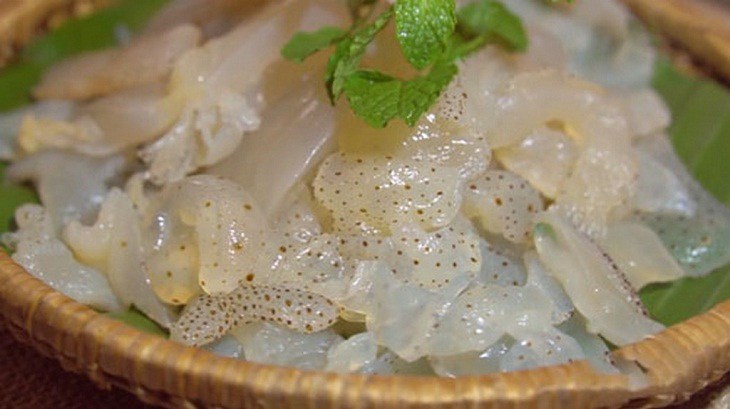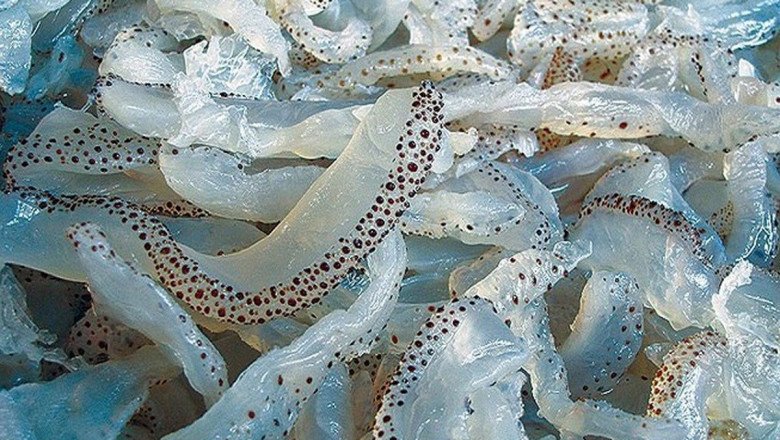Jellyfish are a type of marine creature with mollusks, many long tentacles, with many different sizes and colors. There are over 200 species of jellyfish in the world, some of which are poisonous and inedible, but there are also many types of edible jellyfish, so it is important to consume them safely.
There are about 11 types of jellyfish that have been identified as safe to eat. Jellyfish spoil very quickly, so processing and preservation are extremely important.
Nutritional composition of jellyfish
Different types of jellyfish also vary in nutrient content, but in general, edible jellyfish are low in calories, high in protein, antioxidants and important minerals.
In 58 grams of jellyfish contains about:
– Calories: 21
– Protein: 3 grams
– Fat: 1 gram
Selenium: 45% of the Daily Value (DV)
– Choline: 10% DV
– Iron: 7% DV
– Other minerals: Calcium, magnesium and phosphorus
Although low in fat, studies have shown that about half of the fat in jellyfish is from polyunsaturated fatty acids (PUFAs), including omega-3 and omega-6 fatty acids, which are essential. essential in the diet.
Polyunsaturated fatty acids (PUFAs) in general and omega-3 fatty acids in particular have many benefits related to reducing the risk of heart disease, cancer, good for the brain and eyes, strengthening the immune system, against aging…
Scientific research shows that some types of jellyfish also contain high levels of polyphenols, which are naturally occurring compounds that have been shown to have strong antioxidant effects. Regularly consuming foods rich in polyphenols promotes brain function and protects against a number of chronic diseases, including heart disease, type 2 diabetes, and cancer.
Is it good to eat jellyfish?
Eating jellyfish can bring a lot of health benefits.
1. Great source of selenium
Jellyfish are an excellent source of selenium, an essential mineral that plays an important role in several processes in the body. Selenium has also been shown to have antioxidant properties, protecting cells from oxidative stress.
Adequate selenium intake reduces the risk of several serious diseases, including heart disease, some forms of cancer, and Alzheimer’s disease.
In addition, selenium is important for metabolism and thyroid function.

2. Contains a lot of choline
Choline is an essential nutrient that many people don’t get enough of. Meanwhile, jellyfish contain quite a lot of choline. In 58 grams of jellyfish contain up to 10% DV of choline.
Choline has many important functions in the body, including DNA synthesis, nervous system support, fat production for cell membranes, and fat transport and metabolism.
Choline has also been linked to improvements in brain functioning, including better memory and processing power. This substance may even help relieve symptoms of anxiety.
3. Good source of collagen
Collagen is a protein that plays an essential role in the structure of tissues, including tendons, skin, and bones. Consuming collagen has also been linked to various potential health benefits, including improved skin elasticity and reduced joint pain.
Collagen in jellyfish brings many benefits, the most important of which is lowering blood pressure. One test-tube study demonstrating collagen from ribbon jellyfish showed that its collagen peptides had significant antioxidant and blood pressure-lowering effects.
Additional animal studies have documented that jellyfish collagen protects skin cells from sun damage, improves wound healing, and helps treat arthritis. However, these effects have not yet been studied in humans.
The harm of jellyfish

Not all jellyfish are safe for humans. In addition, some people can still develop an allergic reaction when eating cooked jellyfish.
In addition, the processing and storage of jellyfish is also important in reducing the risk of foodborne illness caused by bacteria or other potentially dangerous pathogens. Certain storage methods can cause jellyfish to have a higher aluminum content. This can cause inflammatory bowel disease and Alzheimer’s disease.
People who should not eat jellyfish
The following subjects should not eat or limit eating jellyfish:
– Children under 8 years old should not eat jellyfish, even processed jellyfish because they are very susceptible to poisoning.
– People who are allergic to seafood.
– Newly ill person.
– People with physical weakness.
– People who have had food poisoning.
at Blogtuan.info – Source: Eva.vn – Read the original article here





